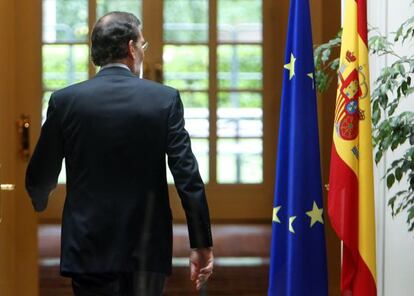The political price of not saying the word "bailout"
Mariano Rajoy's version of Spain aid package draws mockery and mistrust

"To avoid some things from leaking, I don't even let them cross my mind," Mariano Rajoy tells his closest aides from time to time. This phrase captures the essence of a man who lives by the political principle of "wait and see" - a man who likes to let things sort themselves out.
Rajoy's great problem is that he is no longer leader of the opposition -- that is to say, someone who can make any speech he likes, or none at all, with hardly any consequences. Since December 21, 2011 Rajoy has been Spain's prime minister, and his audience is global. He is no longer just talking to his constituency - now, Barack Obama is listening.
Ever since Rodrigo Rato's "resignation" as chief of Bankia, the recently nationalized bank, the government has been accumulating political errors and communication mistakes, all of which have undermined Rajoy's image as a capable, efficient leader.
The latest one -- refusing to call the bank bailout a bailout -- has caused endless hilarity and mockery in the foreign media.
It happened to Zapatero with the word 'crisis.' Now it has happened to rajoy within six months"
"You say tomato, I say bailout" was the title of a Time magazine article by Lisa Abend on the issue. Anything was better than the word bailout: credit line, soft credit, European help, even "yesterday's event."
But the worst part was not the journalists' irony. It was the mistrust of European leaders, who could not figure out whether this non-rescue was a marketing ploy or an inability to grasp reality.
"We created perplexity," says Antonio Gutiérrez-Rubí, an expert in political communication and author of the blog Micropolítica, which is hosted on the EL PAÍS website. "After helping us, and also helping themselves, our European partners expected a more humble, sensible reaction. The images of Rajoy taking the credit in last Sunday's press conference projects the image of a man with a 'bunkerized' vision of things."
"Two contradictory factors come together here: an over dramatization of the situation by the opposition and the unions, and overplaying the normality card by the government," adds Francisco Llera, director of the Basque opinion poll Euskobarómetro. "Thus Rajoy's trip to Poland [to watch Spain's first match at the European Championship]. Faced with both choices, the government wins out: public opinion does not like to be plagued by bad news."
They thought that an absolute victory in Spain automatically generated absolute communication"
But the real bad news has nothing to do with the war of synonyms. The worst part is the belief that the 100 billion euros to rescue part of the Spanish banking sector will not be enough; that toxic assets, that is to say, the credit that is trapped in the property bust, may require even more money, and even a bailout of the entire country, mirroring events in Greece, Ireland and Portugal. This is the thesis supported by the Financial Times, a bible of global capitalism.
Markets have no feelings. All they want is to turn a profit, and they attack any weak points they find. For Bloomberg, the fundamental problem is the lack of European response to the crisis, that is to say, Europe is not really sticking its neck out for the euro.
The Eurogroup finance ministers have approved a bailout whose conditions are still unknown. This is a common occurrence at EU summits: first disaster is viewed up close, then an agreement is reached, and finally the contents are negotiated. Investors are aware of this trick, and that is why they continue to attack, and also why Spain's risk premium keeps rising.
"We all knew that Greece was in bad shape, but nobody expected Spain to be mired in such a huge crisis. Now there are fears of the same thing happening in Italy," says Francesca Caferri, head of the foreign desk at La Repubblica. "Rajoy is also causing great surprise. He does not seem to know where he is going. His changes, his statements that no help is necessary, then it is, but it's not a bailout -- all of that creates confusion and mistrust. Either he is a liar or he does not know what he is doing."
The Wall Street Journal, the other bible of the financial world, fears that this pattern of denial that began with Bankia may be on display again.
Tension is running high: Greece went to the polls on Sunday, and the most likely outcome will be an impasse that makes it impossible to form a government; even if it were possible, that government would likely view Angela Merkel's adjustments with hostile eyes.
"What starts out as a game of synonyms ends up generating political thoughts that are out of touch with reality," says Manuel Seco, a journalist and an expert in television image. "It happened to Zapatero with the word 'crisis.' His insistence on denying it conveyed a sense that the government did not know how to deal with the problem. In Spain, this is called "the Moncloa Syndrome." The really worrying thing is that it has happened to Mariano Rajoy in barely six months."
"The government does not comprehend the global and plural dimension of communication. They thought that an absolute victory [in Spain] automatically generated absolute communication, an absolute logic. They seem surprised to see that it does not work. This attitude is simply not conceivable from someone as well prepared as Rajoy," adds Gutiérrez-Rubí.
The Financial Times was very tough with Rajoy. Its Madrid correspondent, Victor Mallet, wrote on June 8 that Spain is mired in provincial and party politics while urgent matters of state must be negotiated in Berlin or Brussels. The journalist said that Merkel and other EU partners doubt whether Rajoy will be able to achieve fiscal discipline.
"Everyone knows that the savings banks have been run by political parties and unions, and that everyone is guilty," adds Llera. "Eighty percent of citizens are asking for unity: they are weary of the war of reproaches between both main parties. The message is clear: either we are all saved or we all sink."
Tu suscripción se está usando en otro dispositivo
¿Quieres añadir otro usuario a tu suscripción?
Si continúas leyendo en este dispositivo, no se podrá leer en el otro.
FlechaTu suscripción se está usando en otro dispositivo y solo puedes acceder a EL PAÍS desde un dispositivo a la vez.
Si quieres compartir tu cuenta, cambia tu suscripción a la modalidad Premium, así podrás añadir otro usuario. Cada uno accederá con su propia cuenta de email, lo que os permitirá personalizar vuestra experiencia en EL PAÍS.
¿Tienes una suscripción de empresa? Accede aquí para contratar más cuentas.
En el caso de no saber quién está usando tu cuenta, te recomendamos cambiar tu contraseña aquí.
Si decides continuar compartiendo tu cuenta, este mensaje se mostrará en tu dispositivo y en el de la otra persona que está usando tu cuenta de forma indefinida, afectando a tu experiencia de lectura. Puedes consultar aquí los términos y condiciones de la suscripción digital.









































